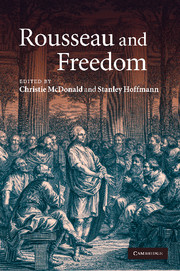Book contents
- Frontmatter
- Contents
- List of illustrations
- Notes on contributors
- Acknowledgments
- List of abbreviations
- Introduction
- PART I
- PART II
- PART III
- 14 Paranoia and freedom in Rousseau's final decade
- 15 Freedom and the project of idleness
- 16 On the uses of negative freedom
- 17 Fail better: Rousseau's creative délire
- Postface: Rousseau and freedom
- Bibliography
- Index
Postface: Rousseau and freedom
Published online by Cambridge University Press: 05 May 2010
- Frontmatter
- Contents
- List of illustrations
- Notes on contributors
- Acknowledgments
- List of abbreviations
- Introduction
- PART I
- PART II
- PART III
- 14 Paranoia and freedom in Rousseau's final decade
- 15 Freedom and the project of idleness
- 16 On the uses of negative freedom
- 17 Fail better: Rousseau's creative délire
- Postface: Rousseau and freedom
- Bibliography
- Index
Summary
Many writers have examined, over the years, Rousseau's views on freedom. One of the most compelling scrutinies is Judith Shklar's Men and Citizens. Her analysis of the “positive freedom” of citizenship in the ideal community of the Social Contract is superb. The multiple requirements Rousseau sets up for the community of the Social Contract make it clear that he did not believe it could be a widely relevant solution to the problem of political liberty – liberty in the polis – within the corrupt world of modern civilization he never ceased to denounce. Shklar has a great deal to say about “men” (and women) in that world. We would like to add some thoughts to her penetrating analysis.
Can one approximate being a “citizen,” if one is forced to live in a corrupt society ridden with inequalities, in which human beings never stop comparing themselves to others and are rarely treated as possible participants in public life? An examination of what could be called “men and women in actual modern societies” leads to a gloomy conclusion: liberty-in-society remains elusive, however hard one tries to protect the individual from the multiple defects so eloquently denounced in the two Discourses. Two examples will suffice.
The first is the case of Emile. On the one hand, his tutor – a thoroughly admirable, if faceless, person – tries to safeguard, or to bring out, l'homme de la nature in his tutee, and to rescue him from the evils of his time and his society by what Rousseau calls “negative education,” so that he will be able to stay “close to his natural condition” and to practice those “first movements of nature” which are “always right.”
- Type
- Chapter
- Information
- Rousseau and Freedom , pp. 292 - 294Publisher: Cambridge University PressPrint publication year: 2010



